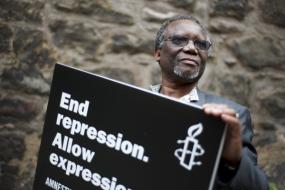Continuing with exile, writing, language, fight for freedom and human rights, it’s not sufficient to mention what an Eastern European poet like Paul Celan has in common with African writing; for instance, Jack Mapanje. The consolation we find in language, however “foreign,” the haunting quality and the brokenness that language and rhythm carry to convey our deepest emotions and struggles, the inconsistencies brought upon by trauma, and the courage to return to that which we hate, which may include language itself, and find ways to use it to our advantage in spite of what it reminds us of.
Only one thing remained reachable, close and secure amid all losses: language. Yes, language. In spite of everything, it remained secure against loss. But it had to go through its own lack of answers, through terrifying silence, through the thousand darknesses of murderous speech. It went through. It gave me no words for what was happening, but went through it. Went through and could resurface, ‘enriched’ by it all.[8]
My first knowledge of Jack Mapanje’s writing was through Susan Kiguli, who was my undergrad professor, and recited several of Mapanje’s poems with such passion and energy you just had to love her, and the poems too. They were awesome, fresh, and you could imagine the rhythms of the talking drum accompanying the beats.
My favorite was Song of Chicken, which was Mapanje’s take on Kamuzu Banda, former president of Malawi who fought for Malawi’s independence and freedom, only to declare himself life-president and become dictatorial towards the very citizens he had vowed to protect. The double meaning and innuendos in the poem still did not keep Mapanje from the president’s wrath and harm. It’s a well-known technique in African oral tradition to speak in metaphors, a style that was well utilized by Russian writers–Daniil Kharms is a master here–who were critical of their governments but also knew it was not safe to make their views open. So anyway, Song of Chicken utilized the oral tradition, and offered a clever and ironic commentary on Kamuzu Banda’s regime.
Song of Chickens
Master, you talked with bows,
Arrows and catapults once
Your hands steaming with hawk blood
To protect your chicken.
Why do you talk with knives now,
Your hands teeming with eggshells
And hot blood from your own chicken?
Is it to impress your visitors?
For ‘three years, seven months and sixteen days,’ Mapanje was jailed, and had to survive by creating poems in his head. The poems sustained him. Now in exile, he writes about his prison experiences, and continues to give his poems beats of his traditional roots. Skipping is one of such poems, and in his own words here’s what Mapanje says:
As a writer, I just developed strategies for writing poems and short stories or little discussions in my head – little lectures to remind myself of what I was once upon a time. The idea was that we were not allowed to read anything. There was no library in the prison, no radio and no newspapers were allowed. You woke up every day looking at the walls and looking at your friends and telling the same stories again and again, and sometimes twisting the stories. A certain sense of solidarity developed – where you know that “the story he is telling me he has told me before”, but you’re polite enough to let him tell it, because he needs the audience and you need something else (ie something other than your own thoughts). But more importantly we developed laughter, as a way of surviving. You laugh at yourself, whatever you’ve done, you laugh at humanity, you laugh at Dr Banda, at all his cronies, who have put you in prison. And you wonder what it is they are doing now. They must be happy that you are in prison now.
One of the things that we were not allowed to do was exercise. But we had to have a bath. In order to have a shower or bath, you needed to sweat or give an indication that you were stinking, and then they would take us to the next set of cells, where there were communal showers. Occasionally, one of the things we used to do was to start skipping on one spot – without a rope, because a rope was not allowed. And so “Skipping Without Ropes” was one of the earliest poems that I wrote. And I actually kept it in my head.
Skipping Without Ropes
I will, I will skip without your rope
Since you say I should not, I cannot
Borrow your son’s skipping rope to
Exercise my limbs; I will skip without
Your rope as you say, even the lace
I want will hang my neck until I die;
I will create my own rope, my own
Hope and skip without your rope as
You insist I do not require to stretch
My limbs fixed by these fevers of your
Reeking sweat and your prison walls;
I will, will skip with my forged hope;
Watch, watch me skip without your
Rope; watch me skip with my hope –
A-one, a-two, a-three, a-four, a-five
I will, a-seven, I do, will skip, a-ten,
Eleven, I will skip without, will skip
Within and skip I do without your
Rope but with my hope; and I will,
Will always skip you dull, will skip
Your silly rules, skip your filthy walls,
You weevil pigeon peas, skip your
Scorpions, skip your Excellency Life
Glory. I do, you don’t, I can, you can’t,
I will, you won’t, I see, you don’t, I
Sweat, you don’t, I will, will wipe my
Gluey brow then wipe you at a stroke
I will, will wipe your horrid, stinking,
Vulgar prison rules, will wipe you all
The hop about, hop about my cell, my
Home, the mountains, my globe as your
Sparrow hops about your prison yard
Without your hope, without your rope,
I swear, I will skip without your rope, I
Declare, I will have you take me to your
Showers to bathe me where I can resist
This singing child you want to shape me,
I’ll fight your rope, your rules, your hope
As your sparrow does under your super-
vision! Guards! Take us for a shower!
Mapanje lives in England, and his beautiful poems are published in the following collections:
Of Chameleons and Gods, 1981, The Chattering Wagtails of Mikuyu Prison (1993), Skipping Without Ropes (Bloodaxe, 1998), The Last of the Sweet Bananas: New & Selected Poems (Bloodaxe, 2004) and Beasts of Nalunga (Bloodaxe, 2007), as well as three anthologies, Oral Poetry from Africa (1983), Summer Fires: New Poetry of Africa (1983) and The African Writers’ Handbook (1999). He edited the acclaimed Gathering Seaweed: African Prison Writing (2002); and has also published a memoir, And The Crocodiles Are Hungry At Night (Ayebia, 2011).


2 Responses to Skipping with Jack Mapanje